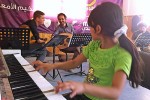Title
So it turns out that teaching a piano lesson to a child in the West Bank is a whole lot like in the United States. There’s plenty of clapping rhythms, singing solfège, and showing how to properly drop your weight through your finger into the keys. Because these activities are vocal or physical rather than verbal, the language barrier was easy to surmount. Indeed, the vocabulary required to successfully get through a lesson consists of no more than a dozen words. Knowing how to count to five, of course, is crucial since each number corresponds with a different finger. There’s also up, down, soft, loud, fast, slow, and, of course, “why didn’t you practice?”
Body
Taq Win helped me a lot. She is an 8-year-old who lives in Am’ari refugee camp, where I was participating in a workshop and concert as part of the Palestinian Piano Project, an outreach mission I undertook this past summer with the help of a generous Juilliard Summer Grant. When Taq Win wasn’t jamming on the keyboard or confiscating my iPhone to take about 500 fuzzy photos of the ceiling, she was giving me Arabic lessons. Hello, my name is Ben: Marhaba, ismi Ben.
That tutorial came in handy when I visited Qalandiya refugee camp a few days later. After winning over a couple of 11-year-old boys by putting a Coke can on my head and pretending I had no idea it was there, we struck up a conversation about music. One of the boys plays the oud, a lute-like instrument native to Arabic and other Middle Eastern cultures, the other plays piano, and they were split down the middle on the question of whether Justin Bieber is cool.
I came to Qalandiya camp with faculty members from Al Kamandjati, the Ramallah-based organization whose mission is “to support the education and schooling of Palestinian children by making music more accessible to them” and the one through which I organized my project. Wielding a large poster board with drawings of different jungle animals, we played excerpts from Saint-Saëns’s Carnival of the Animals and asked the kids to guess which drawing each excerpt depicted. Yet again, music demonstrated its special power of communicating across culture and language as the kids showed off their ability to identify each animal according to the music. The kangaroo was the only animal to give them a little difficulty, probably because these pouched marsupials aren’t exactly known for hopping around the Holy Land.
Qalandiya camp, like Am’ari, is home to the families who either fled or were expelled from their homes in present-day Israeli villages and towns during the 1948 Arab-Israeli War. In late August, more than a month after I returned to the States, The New York Times reported on violence in that camp in which Israeli security forces killed three Palestinians. Such stories feed the perception that violence is an inevitable and permanent condition in that part of the world.
But this time, all I could think about was how normal and fun it was to teach piano to these kids and joke around about Justin Bieber—though nothing about chaos and fighting should be part of the human condition. If teaching music in the West Bank offered me a glimpse into how ordinary life can be for those living under military occupation, it also taught me how disturbing things have gotten when that is considered normal. The singular moments of beauty or joy that music brings are part of the foreground of experience in the West Bank, but they are put in relief by the struggles that continue to be the background of everyday life for people who—like everyone else in the world—work hard, love their families, and enjoy music. To the extent that playing the piano provides a mere escape or diversion from these struggles, I can’t say the project achieved the kind of transformation that is often expected from outreach missions. Though we often assume it can be, it’s not clear that the struggle for justice can learn something from art and music. After this summer, I’m beginning to think it’s the other way around.





